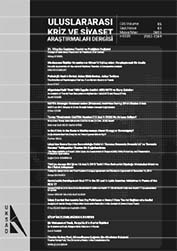İslam Devrimi Sonrasında İran Dış Politikasının Ummu’l Kura Teorisi Bağlamında Analizi
Analysis of Iranian Foreign Policy After the Islamic Revolution in the Context of Ummu’l Kura Theory
Author(s): Firas Elias, Mehmet Seyfettin ErolSubject(s): Inter-Ethnic Relations, Geopolitics
Published by: Mehmet Seyfettin Erol
Keywords: Shiite Geopolitics; The Islamic World;Revolutionary Guards;Islamic Republic;Umm al-Qura Theory;
Summary/Abstract: Ummu’l Kura Theory is a theoretical approach used to define the sectarian doctrine of Iran towards the Islamic World; It reflects a vision focused on Shia expansionism. The theory put forward by Muhammed Javad Larijani positions Iran as the “Guardian of Islam” and grounds the foreign policy understanding of the Velayet-i Faqih system and constitutes the theoretical basis of the sectarian foreign policy understanding, which is described as Shia expansionism. Through theory, Iran centralizes its position in the Islamic world and tries to make itself a religious and political qibla. In this article, Iran’s foreign policy is analyzed within the framework of Ummu’l Kura Theory.
Journal: Uluslararası Kriz ve Siyaset Araştırmaları Dergisi
- Issue Year: 5/2021
- Issue No: 1
- Page Range: 361-385
- Page Count: 25
- Language: Turkish

